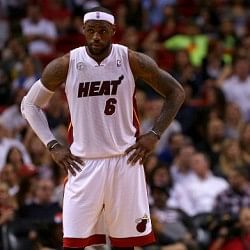
27 games later: the Miami Heat are in pursuit of history
Every moment that passes us immediately becomes a moment in history. The present is now the past already, and with every second forward, the seconds we have left behind become the seconds that define us. We are always experiencing history being made: some historical events are just more memorable than other ones.
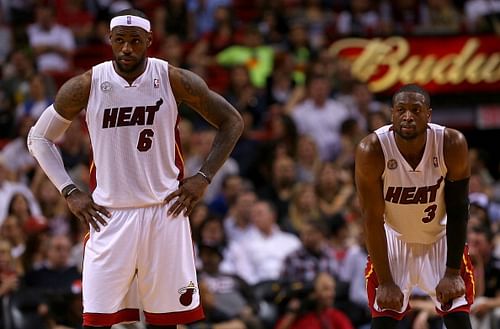
LeBron James #6 and Dwyane Wade #3 led the Miami Heat to a 27-0 streak. (Getty Images)
Take the 2012-13 Miami Heat, for example.
The 2012-13 regular season lasts 173 days, from October 30, 2012 to April 20, 2013, counting the All-Star break in between. In the course of these days, each team plays 82 games each and 1230 total games are played between 30 teams across the league. That’s about an average of 7.12 games played every single day for nearly six months. And we haven’t even started talking about the playoffs yet.
With so much action every day, it is kind of easy to lose track of how significant in history any given moment is on any given day, and how it should be noted. A big comeback win in Cleveland can be Twitter’s flavour of the hour. A powerful dunk by DeAndre Jordan can be the SportsCenter play of day. A big trade in Toronto could be discussed for a whole week. A surprising rookie in Portland or an unleashed rising star in Houston can be talked about for months. A dominating 54-point performance by Stephen Curry becomes the highest scoring output of the season.
There are current events, and then there is history.
What the Miami Heat did from February 1, 2013 – March 27, 2013, was the latter. For that period of 54 days, the defending champions did not lose a single game, winning all 27 of their contests and clocking in the second-greatest winning streak in NBA history.
What we witnessed, what every NBA fan and sports observer – casual or serious – saw over the past two months, was a team at the apex of its powers, a team doing what few others have done before. In 65 years of the NBA, we have rarely before come across a collection of 12-15 basketball-playing individuals that make together such a successful whole. Whether we like it or hate it, we should savour it.
Right now, this is a team that seems to be fulfilling its potential, fulfilling on the promise that they made to their fans and to themselves of becoming one of the greatest teams of all-time.
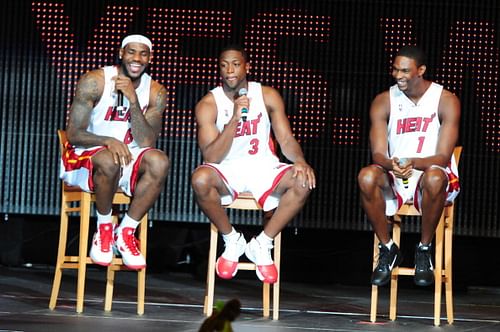
(L-R) LeBron James, Dwyane Wade and Chris Bosh attend HEAT Summer of 2010 Welcome Event at AmericanAirlines Arena on July 9, 2010 in Miami, Florida. (Getty Images)
It all began in the summer of 2010, when a free agent coup that added reigning MVP LeBron James and All-Star Chris Bosh to a roster that already had superstar Dwyane Wade. Together, the Miami Big Three promised big things and promised them a little too early. They held a welcome party, arrogantly celebrating themselves, and promising that their union could bring together “Not 1, not 2, not 3, not 4, not 5…” etc. championships to South Beach.
But of course, great players don’t necessarily make for great teams, at least not straight away. The Heat started off slowly, but soon began to gather pace in their first season together and were looking in championship form by the time the playoffs rolled around. They were still creases to be ironed: the Heat’s offense was too hap-hazard, relying on either LeBron or Wade to be creator while the others stood around waiting for magic to happen. Thanks to their talent, that magic happened often, but it would also lead them to certain roadblocks. This ‘unfinished’ team was still good enough – particularly on the defensive end – to reach the NBA Finals before they were exposed by the tactically better prepared Dallas Mavericks. LeBron had a nightmare series, and choked spectacularly on basketball’s biggest stage.
A year later, the Heat came back stronger, and LeBron had a season to remember in the lockout-shortened 2011-12. He won his third MVP award, affirming his position as basketball’s best player, and the Heat stormed back to the Finals again. This time, they suffered no such setbacks against Indiana and Boston. And Oklahoma City could stop them in the Finals. LeBron didn’t choke, Wade showed up when it was important, and Miami even survived a few weeks without Bosh in the playoffs as they claimed a NBA championship last June.
And then they got better.
The Heat this season – short in size and slightly less intense on the defensive end – have nevertheless developed into a team that is no longer just the best team for a season, but one of the best teams for all seasons. This 27-game winning streak proved that. When the Big Three first got together in 2010, outlandish predictions were made for them, like how they could win more games in a season than the ’95-96 Bulls or have a ‘legit shot’ at the ’71-72 Lakers 33-game winning streak. Two and a half years later, this team is proving that they can belong in that conversation.
The Heat already have a championship, and with it, the confidence of knowing that they are winners every night this season. They already have the best player in the league – LeBron James – the man who is destined to win this fourth MVP award in five years. They already have the NBA’s best supporting star in Wade, a top five player on his night. Bosh has been more or less reduced to playing the role of a glorified role player, one which he is performing well. They have great shooters like Mario Chalmers, Mike Miller, Shane Battier, and the newly added Ray Allen and Rashard Lewis to maximise LeBron and Wade’s penetration in the paint. In Battier and Udonis Haslem, they have the type of role players who play to win every single night. In Haslem and Chris Anderson, they have players to protect the basket. In Erik Spoelstra, they have a criminally underrated roach that is making this all work.
When the Heat were in the midst of this streak and clicking at their absolute best, we saw the potential of having these players around LeBron and Wade. We saw the potential of a system where the best player in the league was offered the best possible supporting cast to fully maximise his talents and not negate anything from them. Unlike the previous two years, there was no confusion between LeBron and Wade on who would be taking charge. Things happened more smoothly, more organically. The offense became a thing of beauty and the Heat took over the top spot in the league in points-per-possession. They were passing well, they were outrunning opponents and whenever they were tested, they were coming back and finishing games.
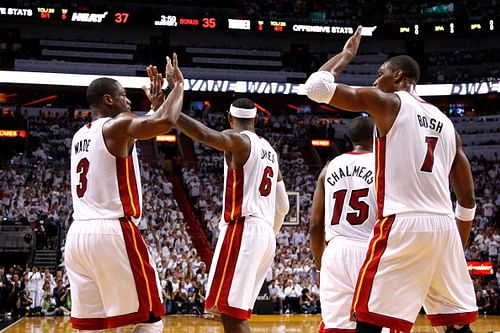
The Heat are a near-perfect team that plays near-perfect basketball. Getty Images)
In the midst of this all, they came back from several double-digit deficits to win, including a 27-point deficit in Cleveland. No one was doubting LeBron’s clutch attributes anymore.
“I think the first year when this team was put together, we didn’t know each other the way we needed to, to really get through those tough times in the game.” said Wade after the Heat won their 23rd game in a row, against Boston, in Boston, after going down by double digits again, “Now, no matter what it is, we believe in each other.”
Miami had lost to Indiana on February 1. Against the Raptors in the next game, the streak began. The ‘Ws’ in the win column kept piling up. All of a sudden, they had gone the rest of February without a loss. A few games later, they were close to tasting 20 consecutive wins. Against Boston, they made it 23 and officially left behind the 22-game-streak by the 2008 Rockets. And then they won four more before finally dropping the March 27 matchup in Chicago.
Every team usually brings their best against the defending champions, but after around win number 20 or so, the race to be the first to ‘take down the Heat’ went into fever pitch. In an atmosphere of big egos and competitive personalities, everyone wanted their chance at the Heat, and one by one, they all failed. Philadelphia. Milwaukee. Toronto. Boston. Cleveland. Detroit. Charlotte. Orlando. Whether or not the Heat players even admitted it, they were writing history, and they were trying their damned best to make sure that their history went on. Their average win margin over the 27 games was 11.9 points.
When the Heat finally went down to the nitty-gritty Bulls, there was more celebration than disappointment. So yes, they had missed the mark of the 1971-72 Lakers, who won an incredible 33 games in a row. But they brought us as close as we could get to that feat in modern times.
We saw a team that put everything else happening daily across the NBA into perspective. We saw a streak that was bigger than Retweets, Breaking News Scrolls on SportsCenter, or front page headlines. We saw a team make timeless history.
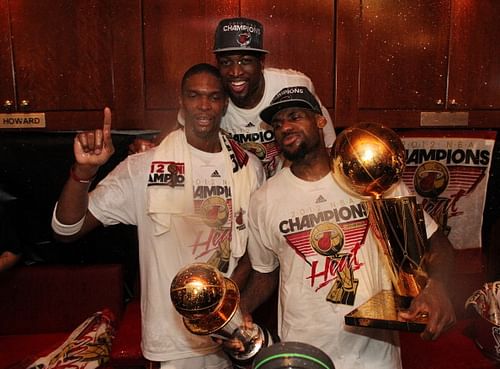
Is another Championship on the cards? (Getty Images)
In the middle of all this dominance was LeBron. During their streak, the ’72 Lakers were led by Gail Goodrich in points, Wilt Chamberlain in rebounds and Jerry West in assists. The ’13 Heat in their streak were led by LeBron James in points (27.0 ppg), LeBron James in rebounds (8.1 rpg) and LeBron James in assists (8.0) (and for good measure, in minutes played, too). He shot at a fantastic 57.5 percent from the floor, and enjoyed an unbelievable streak of at least 30 points on at least 60 percent scoring in each outing for six consecutive games. With Wade also playing at a high level and the role-players all stepping up their games, this streak was obviously not a one-man show, but LeBron’s brilliance was otherworldly.
But now the streak is past. History has been written and recorded. They are now chasing the future, and chasing the chance to upgrade their memorable season into a legendary one.
Because to validate this streak further, and to truly validate their place amongst or above the greatest teams of all time – the 60s Celtics, the ’72 Lakers, mid-80s Celtics, mid-80s Lakers, 90s Bulls, early 2000s Lakers – they have to win another championship. Nothing short of that will do. It will be the perfect cap of the perfect year for a near-perfect basketball team.
It took this great run by Miami for us to recall again how great the ’71-72 Lakers were, how astonishing it was for a team to win 33 in a row and then go on to win a championship, and how astonishing it still is that it took over four decades for anyone to even creep close to that record. Now, it is Miami’s challenge to ensure that their future becomes memorable history, too. The type of history that we recall over decades of changing eras in the NBA. The type of history that will truly last forever.